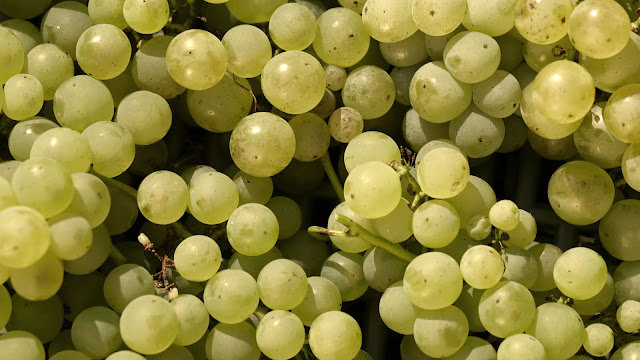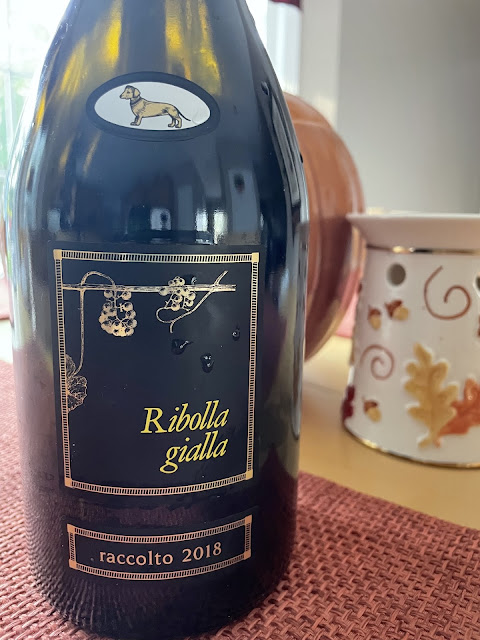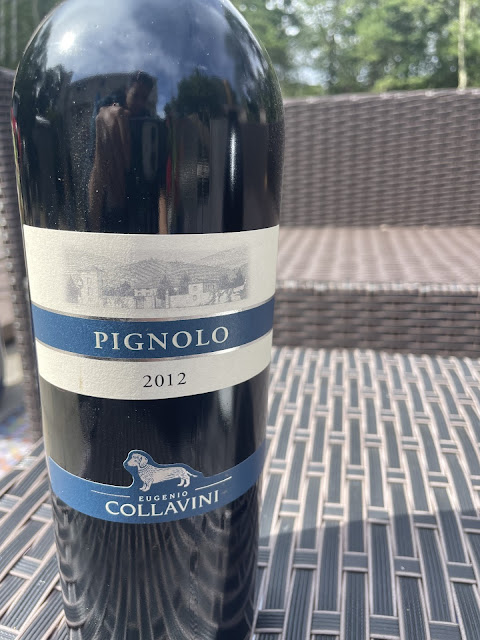This week I’m staying in the Friuli Venezia Giulia region highlighting the Collavini winery. Collavini crosses between the Collio DOC and Colli Orientali DOCs. I'll be sharing some of their wines focused on Ribolla Gialla including a sparkling Ribolla Gialla, a Collio Bianco blend and a wine made from the Pignolo grape.
The Eugenio Collavini Winery
Collavini began in 1896 in Rivignano, a comune of the Udine province, when Eugenio Collavini was supplying local stores and noble families of Udine with his wine. His son, Giovanni, led the winery through both of the World Wars that faced this region. Manlio, the son of Giovanni, is whom really took Collavini to new heights moving the estate to new terroirs establishing the headquarters in Corno di Rosazzo at the XVI century Villa Zucco Cuccagna and using more advanced technology in their winemaking production. Today the winery is continued to be run by Manlio and his two sons, Giovanni and Luigi. And the generations continue!
 |
| Luigi, Manlio and Giovanni Collavini |
Today the Collavini winery owns about 420 acres producing about 1.5 million bottles with about half of them being exported around the world. I connected with Luigi Collavini for a couple questions regarding their production between the Colli Orientali DOC and Collio DOC and their pride grape, Ribolla Gialla.
What do you see as the greatest differences between the wines they produce in the Collio and Colli Orientali DOCs in terms of terroir and grape selection?
In the Friuli region, Collio and Colli Orientali are known to be the best DOCs in terms of quality. This is mainly because these two DOCs are mostly made of hillside vineyards. Both areas stretch along the Slovenian border with Collio a bit on the southern side with respect to Colli Orientali. Generally speaking, there are not too many differences between these two areas. What makes a difference is how the vineyard is exposed and how internal the vineyard is. What I mean is that some areas of these two DOCs which are more exposed to the flatlands of Friuli will gain more heat in the summer and might be more suitable for red wines or white varietals that need more sun and heat to mature. Areas more internal or northern are nowadays more suitable for planting white aromatic varietals. We chose to plant our varietals after close consideration to the aforementioned.
How do you feel that your Turian made from Ribolla Gialla does in Colli Orientali as opposed to growing it in Collio? What was your choice for growing it in Colli Orientali?
Our Turian made from Ribolla Gialla comes from a vineyard that is located on the Rosazzo hill, which is south-west from the Rosazzo Abbey, where Benedictine monks started cultivating this grape in the late 1200’s. So, in this case, it is history that teaches us which the best place to plant this grape is.
 |
| Ribolla Gialla grapes from Collavini |
The Wines
It was fun to experiment with a sparkling Ribolla Gialla from Collavini as I tasted many dry Ribolla Gialla wines on my visit to Collio. Collavini started working with the Ribolla Gialla grapes in the end of the 70’s starting with about 11 acres, later adding another 27 acres. Today they produce more than 200,000 bottles of Ribolla Gialla. The 2018 Eugenio Collavini Ribolla Gialla Vino Spumante di Qualita Brut Millesime is made from 100% Ribolla Gialla using the Martinotti method, also known as the charmat method. The initial fermentation takes places partially in tanks and barrique and is refermented in large horizontal autoclaves. It’s aged 30 months fining on the lees and an additional 12 months in the bottle. The wine was straw yellow with tints of green. Subtle aromatics with peach notes. Tiny bubbles that released into a softer mousse with finesse. Refreshing and dry on the palate showing tangy, citrus pith notes. ABV 12% SRP $45.
On the label of Collavini’s wines you find a dachshund that was Manlio’s first dog, Ribolla, and his side kick in life. When Ribolla passed on, Manlio wanted to put a memory of him on the bottles.The 2020 Eugenio Collavini "Turian" Ribolla Gialla Colli Orientali DOC is made from 100% Ribolla Gialla picked from their historic, ancient vineyard, Clo Turian. These grapes are harvested late and macerate through the night and are vinified in stainless steel. This wine is straw colored with golden hues. Nice aromatics of stone fruit and tropical pineapple. Medium-bodied with a delicate touch. Refreshing acidity and nice citrus fruit and pineapples on the palate with a touch of minerality on the finish. SRP $35
Collavini’s Collio white blend is the 2018 Eugenio Collavini Broy Collio DOC made from 50% Friulano, 30% Chardonnay and 20% Sauvignon. The name of the wine, Broy, comes from broili which are small gardens that are grown next to old Friulian homes. This bianco blend is made from grapes partially dried in ventilated lofts with close to 0% humidity, except the Sauvignon. The grapes are blended and fermented partially in steel and barrique. Brilliant straw colored with green hues. Floral aromas along with citrus, tropical fruit and a hint of tomato leaf. A medium-bodied wine with bright acidity up front and tangy citrus notes. I picked a little heat on this one in the back of my throat, but it only has 13.5% ABV SRP $55
Lastly, and my pick of today’s tasting of the Collavini wines, is their 2012 Eugenio Collavini Pignolo Colli Orientali del Friuli DOC. Made from 100% Pignolo grapes, these grapes are dried on trays for 20 days for concentration and then fermented for 3 weeks on the skins. The wine is aged 5+ years in small oak casks and an additional 2 years in the bottle. Transparent ruby colored, aromas of black cherry, chocolate and spice waft from the glass. Lively acidity some some chewy tannins. Dark, dried fruits on the palate, mostly blackberries. A dense wine with nice concentration and structure. ABV 14% SRP $65





No comments:
Post a Comment